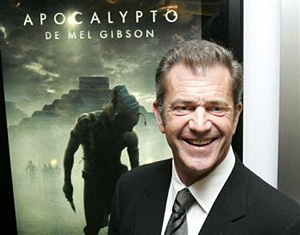 |
 |
 |
 Entertainment | March 2007 Entertainment | March 2007  
Gibson, Woman Trade Words at Screening
 Sandy Cohen - Associated Press Sandy Cohen - Associated Press


| | Mel Gibson is shown during a private screening for his movie, "Apocalypto," in Mexico City. (AP/Gregory Bull) |
Los Angeles - Mel Gibson exchanged angry words with a university professor who challenged the accuracy of his film "Apocalypto" at an on-campus screening.

Gibson was answering questions from the crowd at California State University, Northridge, Thursday night when Alicia Estrada, an assistant professor of Central American studies, accused the actor-director of misrepresenting the Mayan culture in the movie.

Gibson directed an expletive at the woman, who was removed from the crowd.

"In no way was my question aggressive in the way that he responded to it," Estrada said. "These are questions that my peers, my colleagues, ask me every time I make a presentation. These are questions I pose to my students in the classroom."

Gibson's publicist, Alan Nierob, characterized the professor as "a heckler."

"The woman ... was rude and disruptive inasmuch as the event organizers had to escort her out," Nierob said.

Lauren Robeson, editor-in-chief of the campus newspaper, the Daily Sundial, said Gibson denounced Estrada as a troublemaker.

"It was a brief disruption to an otherwise interesting, stimulating event from our students' perspectives," said university spokesman John Chandler. "The students were very appreciative of Mr. Gibson being there. He spent a lot of time answering questions about moviemaking."

Before the 3 1/2-hour program ended, Gibson "expressed regret that things had gotten out of hand," Chandler said.

Estrada is demanding an apology, "not only to me but to the Central American program at CSUN, to the university and most importantly to the Mayan people and Mayan community."

About 130 students attended the screening, part of a series sponsored by the school's Cinema and Television Arts Department. The interruption occurred about 20 minutes into Thursday's program, when two audience members refused to relinquish the microphone after asking their questions, Chandler said. They were escorted out by campus security, he said, and Gibson continued answering questions for another 40 minutes.

"Apocalypto" was released in December, less than six months after Gibson's drunken driving arrest and subsequent anti-Semitic ramblings made international headlines. The R-rated epic about the decline of Mayan civilization shows Mayan rulers slitting throats and beheading and ripping the beating hearts from the chests of their enemies.

Human sacrifice among the Mayans has been well-documented in recent years and is accepted as fact by most anthropologists, knocking down a previous theory that the culture did not take part in such bloody rituals.

However, there are some scholars and Indian activists who still believe the human sacrifice accounts are false or overblown, and an attempt by racist scientists to paint the culture as violent.

"This isn't the Mayan culture," Juan Tiney, leader of the National Indian and Farmer Committee, Guatemala's biggest Mayan organization, told the AP. "Although it might be part of it, there was also culture, economics, astronomical wealth and language. ... It discredits a people to present them in this manner."

Gibson "did his homework and consulted with world authorities on this matter," Nierob said.

"Apocalypto" has grossed more than $100 million worldwide, and it earned three Academy Award nominations.

Associated Press writers John Rogers in Los Angeles, Traci Carl in Mexico and Juan Carlos Llorca in Guatemala contributed to this report. | 
 | |
 |



